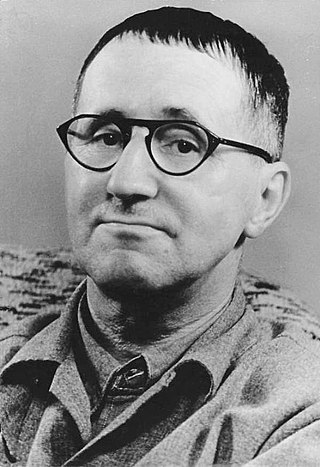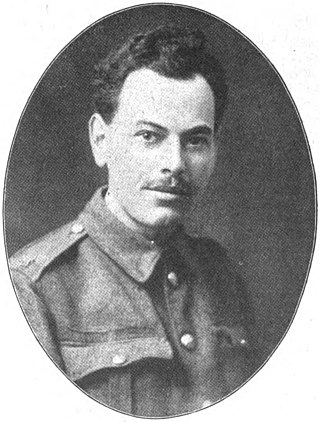
Karel Čapek was a Czech writer, playwright, critic and journalist. He has become best known for his science fiction, including his novel War with the Newts (1936) and play R.U.R., which introduced the word robot. He also wrote many politically charged works dealing with the social turmoil of his time. Influenced by American pragmatic liberalism, he campaigned in favor of free expression and strongly opposed the rise of both fascism and communism in Europe.

Hanns Eisler was a German-Austrian composer. He is best known for composing the national anthem of East Germany, for his long artistic association with Bertolt Brecht, and for the scores he wrote for films. The Hochschule für Musik Hanns Eisler Berlin is named after him.

Marcus Samuel Blitzstein, was an American composer, lyricist, and librettist. He won national attention in 1937 when his pro-union musical The Cradle Will Rock, directed by Orson Welles, was shut down by the Works Progress Administration. He is known for The Cradle Will Rock and for his off-Broadway translation/adaptation of The Threepenny Opera by Bertolt Brecht and Kurt Weill. His works also include the opera Regina, an adaptation of Lillian Hellman's play The Little Foxes; the Broadway musical Juno, based on Seán O'Casey's play Juno and the Paycock; and No for an Answer. He completed translation/adaptations of Brecht's and Weill's musical play Rise and Fall of the City of Mahagonny and of Brecht's play Mother Courage and Her Children with music by Paul Dessau. Blitzstein also composed music for films, such as Surf and Seaweed (1931) and The Spanish Earth (1937), and he contributed two songs to the original 1960 production of Hellman's play Toys in the Attic.
The White Plague is a play written by Czech novelist Karel Čapek in 1937. Written at a time of increasing threat from Nazi Germany to Czechoslovakia, it portrays a human response to a tense, prewar situation in an unnamed country that greatly resembles Germany with one extra addition: an uncurable white disease, a form of leprosy, is selectively killing off people older than 45. It was adapted as the film Skeleton on Horseback by Hugo Haas.

Mother Courage and Her Children is a play written in 1939 by the German dramatist and poet Bertolt Brecht (1898–1956), with significant contributions from Margarete Steffin. Four theatrical productions were produced in Switzerland and Germany from 1941 to 1952, the last three supervised and/or directed by Brecht, who had returned to East Germany from the United States.

Erwin Friedrich Maximilian Piscator was a German theatre director and producer. Along with Bertolt Brecht, he was the foremost exponent of epic theatre, a form that emphasizes the socio-political content of drama, rather than its emotional manipulation of the audience or the production's formal beauty.

Ján Cikker was a Slovak composer, a leading exponent of modern Slovak classical music. He was awarded the title National Artist in Slovakia, the Herder Prize (1966) and the IMC-UNESCO International Music Prize (1979).

Paul Dessau was a German composer and conductor. He collaborated with Bertolt Brecht and composed incidental music for his plays, and several operas based on them.
Schweyk in the Second World War is a play by German dramatist and poet Bertolt Brecht. It was written by Brecht in 1943 while in exile in California, and is a sequel to the 1923 novel The Good Soldier Švejk by Jaroslav Hašek.

Karolos Koun was a prominent Greek theater director, widely known for his lively staging of ancient Greek plays.
Round Heads and Pointed Heads is an epic parable play written by the German dramatist Bertolt Brecht, in collaboration with Margarete Steffin, Emil Burri, Elisabeth Hauptmann, and the composer Hanns Eisler. The play's subtitle is Money Calls to Money and its authors describe it as "a tale of horror." The play is a satirical anti-Nazi parable about a fictitious country called Yahoo in which the rulers maintain their control by setting the people with round heads against those with pointed heads, thereby substituting racial relations for their antagonistic class relations. The play is composed of 11 scenes in prose and blank verse and 13 songs. Unlike another of Brecht's plays from this period, The Mother, Round Heads and Pointed Heads was addressed to a wide audience, Brecht suggested, and took account of "purely entertainment considerations." Brecht's notes on the play, written in 1936, contain the earliest theoretical application of his "defamiliarization" principle to his own "non-Aristotelian" drama.
The Mother may refer to:

Olga Scheinpflugová was a Czech actress and writer. She was a daughter of the writer, journalist and playwright Karel Scheinpflug. In 1935, she married the writer Karel Čapek.

Eugen Berthold Friedrich Brecht, known professionally as Bertolt Brecht, was a German theatre practitioner, playwright, and poet. Coming of age during the Weimar Republic, he had his first successes as a playwright in Munich and moved to Berlin in 1924, where he wrote The Threepenny Opera with Kurt Weill and began a life-long collaboration with the composer Hanns Eisler. Immersed in Marxist thought during this period, he wrote didactic Lehrstücke and became a leading theoretician of epic theatre and the Verfremdungseffekt.

Yılmaz Onay was a Turkish author, theatre director and translator.

The Mother is an anti-war drama written by Czech novelist and playwright Karel Čapek, in 1938. The play is influenced by the Spanish civil war and portrays the difficult relationship between men who wanted to fight, and their mothers and loved ones who did not want them to go. It also shows the fight against fascism, and the emotional turmoil and suffering that war brings. The play emphasizes the unnecessary difficulties of war and the complex relationships during war, emphasizing that although wars are bad, sometimes we have no choice but to fight them to protect our freedom.

Lala Mnatsakanyan is an Armenian actress and Honoured Artist of Armenia.

(Percy) Paul Selver was an English writer and translator. A prolific translator of Czech literature into English, he was best known as the translator of Karel Čapek.